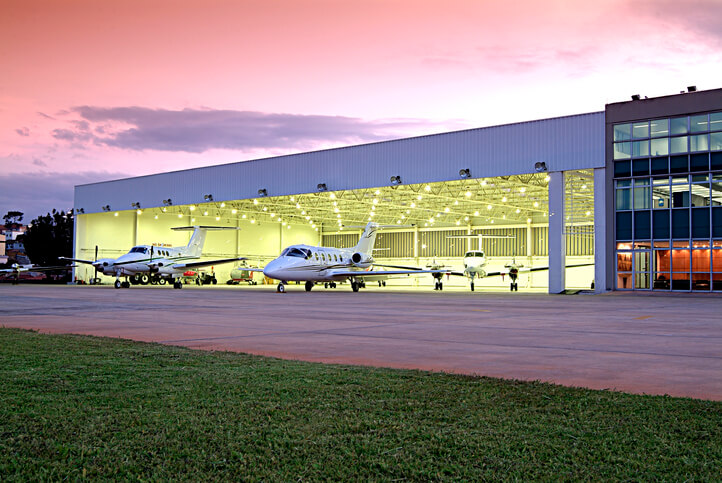
As any private aircraft owner knows, deciding where to hangar your plane is just as important as deciding what type of aircraft to acquire or which aircraft management company to work with. Airplane hangar costs can account for a significant portion of the total cost of owning a plane, so it’s important that you thoroughly evaluate your private aviation needs prior to choosing a private plane hangar.
The Importance of Location & Utilization
Any search for private jet hangar space should begin with two key considerations: location and utilization.
Before you can compare storage options, you must first determine how frequently you intend to fly your private aircraft, and which airport you intend to regularly depart from and return to. For example, if you fly six or seven times a month out of Teterboro Airport in New Jersey, it would hardly make sense to store your plane at a smaller regional airport like Allentown, Pennsylvania. Although jet hangar space in smaller regional airports requires a relatively low upfront investment, it also comes with hidden costs.
Should you decide to hangar your plane in Allentown, you’ll need to position it over to and back from Teterboro for each trip. The cost for these positioning flights can be high as a one-time expense, let alone six or seven times a month. It’s common to purchase 50% or more of your fuel away from your home base. Any reduced fuel cost benefits at your satellite remote base would be limited due to the positioning flight to Teterboro and aircraft landing weight limitation. You would likely pay Teterboro prices for fuel at the start of each trip, rather than the lower Allentown prices.
Location is also an important factor to consider in regard to available resources. For example, if your plane breaks down in a private jet hangar at Teterboro Airport, there are maintenance support options and staff on-site who can get it back up and running before its next scheduled flight. By comparison, in order to get the same level of service at a smaller regional airport, you would likely want to hire your own dedicated maintenance director, which could cost hundreds of thousands of dollars each year. This same logic also extends to other resources and services, such as de-icing services, dispatch reliability and general aircraft support services. The more remote the hangar location, the fewer options you have, and the more money you may need to spend or invest in resources.
If you fly infrequently and want to offset some of the fixed costs of your aircraft through chartering, hangaring your plane in a remote area could cause you to fall short of your charter goals. From a purely pragmatic perspective, very few charter clients fly to Aspen or the Bahamas from smaller regional or municipal airports. Relocating your aircraft at the charter’s expense will increase the flight time and overall cost of the trip. In the charter market, your aircraft will be more competitive if it’s hangered in a more urban area.
The primary takeaway here is that unless you fly infrequently — that is, once a month or less — and require little or no charter on your aircraft, or you intend to fly out of a satellite airport, it makes more sense to look for jet hangar space in a major metropolitan area.
Aircraft Hangar Options: Buy, Build or Rent
As a private aircraft owner, you have a few options available to you when it comes to aircraft hangar space. But before you can compare those options, you must first determine whether you intend to buy your own jet hangar space or rent it.
If you own multiple aircraft, purchasing an existing hangar space can be a sound option. And, if you would prefer to customize your space, building a private jet hangar is also an option. That said, it can be cost prohibitive to buy (and, especially, to build) a hangar in a major metropolitan area, where land is generally scarce and, therefore, in high demand.
It can be more affordable to buy or build in more remote areas, though, as we explained earlier, this also has its drawbacks. If you choose to buy or build a private jet hangar, it is possible to offset costs by renting out additional space within the hangar, but this comes with its own set of challenges.
In most cases, renting out hangar space is the most logically and financially sound choice. When it comes to renting hangar space, you have three options:
- Shared FBO/Airport Hangar: As its name implies, in this scenario, you would rent hangar space through a fixed-base operator (FBO). Though generally considered to be more cost effective than renting out an entire hangar, the price of renting out a single space varies from one airport to another depending on demand. Some FBOs and airports will include maintenance and other services in the cost of renting, though, again, this varies. It is important to note that although a shared hangar might be a more cost-effective option, it does come with certain drawbacks, such as space being filled to capacity and an increased risk of hangar rash due to the need to regularly move your aircraft, as well as others.
- Shared Private Hangar: This is, essentially, the same concept as a shared FBO/airport hangar, with the exception that you would rent hangar space from a private individual rather than an FBO/airport.
- Individual Rented Hangar: If you wish to house multiple planes, safeguard your investment against hangar rash or avoid the inconvenience of at-capacity hangar space, renting an entire private jet hangar could be the right move. Renting an entire hangar is, understandably, more expensive than renting space within a shared hangar, though this is unlikely to be a barrier to entry to those for whom cost is less of a concern. It is important to note, however, that finding an available exclusive-use hangar may prove quite the challenge if you are looking in high-demand areas.
Private Jet Hangar Design Considerations
Although it might not look like much from the outside, a lot of care and consideration goes into the design of any private jet hangar. First and foremost, the designer must consider the ground space, which comes at a premium, especially in airports or airfields located in metropolitan areas. The square footage of the hangar must be stretched to its fullest capacity, and its layout organized in such a way that maintenance and repair crews can easily access the facility and each aircraft as needed.
The safety of both the aircraft and aircraft personnel is also a chief concern when designing private jet hangar space. Therefore, it’s vital that the designer create a contingency plan for any foreign object debris (FOD) that might pass through the space — a likelihood given the volume of aircraft traffic that passes through a jet hangar on any given day. If left unchecked, residual FOD can be sucked into engine intakes, which compromises operational safety. Bearing this in mind, it’s important that private jet hangar design includes an FOD containment strategy to prevent such an outcome.
Fuel is another major consideration when choosing where to build a hangar. You will want to make sure your hangar has fuel rights at that airport. This will allow you to pump your own fuel and potentially lower your cost, especially if the airport has only one FBO. If you do not have the ability operate your own fuel farm, you will have to buy fuel from a local FBO at the airport. Airports with multiple FBOs are usually very competitive and would be beneficial when negotiating your fuel cost. In certain geographic areas, snow removal and deicing are also services a local FBO competing for your business can provide.
Finally, security is a key component of quality jet hangar design. Private aircraft must be kept safe not only from the elements, but also from unauthorized personnel. There are any number of security elements that can be incorporated into jet hangar design, such as CCTV surveillance, alarm systems and access control systems.
It’s important keep these design elements in mind when evaluating aircraft storage in order to ensure that your plane is kept in top condition.
Make Your Search Easier
Finding the perfect space to store your private aircraft can be something of a challenge. Fortunately, the consultants at Essex Aviation have years of experience and a network of professional contacts within the private aviation industry to help make your search a little easier. To find out how we can help you locate the private jet hangar space that best accommodates your financial and travel-related needs, contact Essex Aviation today.








